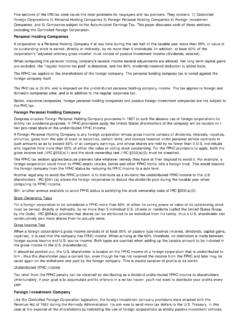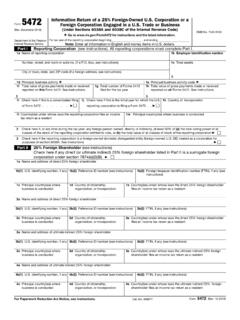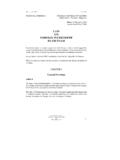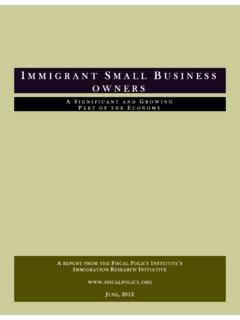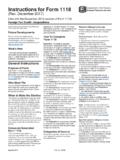Transcription of Controlled Foreign Corporation Tax Guide - AVC ADVISORY
1 Controlled Foreign Corporation Tax Guide Under limited circumstances, a person can be a shareholder of a Foreign Corporation who is not required to pay income taxes on the income of the Corporation until that income is distributed to the owners as a dividend (or possibly as a salary). Many years ago, the income of Foreign corporations was not taxed unless it was derived from sources. In 1962, exceptions were created to deter the use of Foreign corporations as a way to avoid taxes. These exceptions have evolved into the insanely complex rules referred to as the " Controlled Foreign Corporation " rules.
2 Shareholders of a Controlled Foreign Corporation (CFC) are subject to current income tax on "certain" income of the CFC. Generally, Foreign investment income and certain kinds of Foreign source business income are subject to current taxation to shareholders. This report attempts to provide a simplified and abbreviated explanation of the "certain" types of income that are taxable and not taxable. Source Income of a Foreign Corporation A Foreign Corporation , whether owned by shareholders or Foreign shareholders, may be subject to income taxation. If the Foreign Corporation has source business income (defined in IRC Section 861) that is effectively connected with the conduct of a trade or business or if the Foreign Corporation has a permanent establishment in the , then it is subject to taxation.
3 The Foreign Corporation , irrespective of who the shareholders are, will file a Form 1120 and pay corporate income taxes on its source income from a trade or business in the If the Foreign Corporation is subject to income taxation and it also has shareholders, then later distributions to those shareholders, if treated as dividend distributions, will be subject to an additional personal income tax (double tax since the Corporation receives no deductions for dividends paid). However, this is the same treatment as dividends received by shareholders of corporations. The has no taxing authority over a Foreign Corporation with no source income and no permanent establishment in the However, the tax laws do have taxing authority over shareholders (as defined below) of Foreign corporations.
4 Description of Shareholders This authority of taxation comes from the Controlled Foreign Corporation rules that tax shareholders on "subpart F" income (described below). A Controlled Foreign Corporation is one in which shareholders own more than 50 percent, by vote or value, of the Foreign Corporation . Only persons can be " shareholders." IRC. Section 957(c) refers to IRC Section 7701(a)(30) for the definition of a person (which is very broadly defined to include individuals, partnerships, corporations, trusts and estates). A shareholder, for purposes of determining whether there is a Controlled Foreign Corporation , is one who owns 10 percent or more, by vote, of the Foreign Corporation [IRC.]
5 Section 951(b)]. In determining the 10 percent or more ownership, the attribution rules (described below) of both IRC Section 958(a) and IRC Section 958(b) apply. Once it is determined (through direct ownership, indirect ownership under IRC Section 958(a) and constructive ownership under IRC Section 958(b)), that there are, in the aggregate, shareholders who own more than 50 percent, by vote or value, in the Foreign Corporation , it is classified as a Controlled Foreign Corporation (CFC). Please note that only those shareholders that own (directly or indirectly) 10 percent or more of the Foreign Corporation stock are included in the "more than 50 percent" ownership test.
6 Thus, a Foreign Corporation with twenty shareholders with equal shares of 5 percent of the Foreign Corporation is not a CFC. Or, if a Foreign person owns 50 percent or more of the Corporation , then no combination of persons can own "more than 50 percent" of the Foreign Corporation . If one person owns 40 percent of a Foreign Corporation , and ten persons each own 6 percent, it is not a CFC, even though persons own 100 percent of the stock. Only one of those persons is a " shareholder" as defined for this purpose. However, each person's ownership percentage is determined by taking into account the attribution and constructive ownership rules.
7 The phrase "attribution" means that one taxpayer is deemed to own the shares of certain other related taxpayers - such as a spouse, child or parent - because the law presumes that these persons have a common interest. "Constructive ownership" is the same as attribution but it is usually applied with respect to entities in which the taxpayer has some control or beneficial interest. A beneficiary of a trust or estate is deemed to own a portion of any stock owned by the trust or estate, based on the rights of the beneficiary with respect to distributions from the trust or estate. A 50 percent or more shareholder of a Corporation or 50 percent or more partners in a partnership are deemed to have a proportionate interest in stock owned by the Corporation or partnership.
8 Thus, ownership of a Foreign Corporation is derived from the direct ownership of the taxpayer plus any indirect ownership arising from the attribution and constructive ownership rules. With respect to Foreign corporations, these rules are insanely complicated and this is the shortest explanation without getting involved in the maze of code sections relating to this subject. However, these terms will be further discussed below in connection with the explanation of "subpart F" income. Description of Subpart F Income Subpart F income is defined under IRC Sections 952 - 954. The following is a general summary of the income that is classified under subpart F.
9 Basically, " source income" means income derived from conducting a trade or business in the , income from services performed in the and income from property located in the It also includes dividends on the stock of corporations and interest on bonds or other evidences of debt from sources. (There are exceptions of course.). There are two categories of "subpart F income" that are discussed below, but the following are the five categories listed in IRC Section 952: (1) insurance income as defined at IRC Section 953;. (2) Foreign base company income as defined at IRC Section 954;. (3) income from countries subject to international boycotts [IRC Section 999].
10 (4) illegal bribes, kickbacks and similar payments [IRC Section 162(c]; and (5) income from countries where the has severed diplomatic relations [IRC Section 901(j)]. The major category applicable to most Foreign corporations is " Foreign base company income,". which is defined to include: (1) Foreign personal holding company income [IRC Section 954(c)];. (2) Foreign base company sales income [IRC Section 954(d)];.(3) Foreign base company services income [IRC Section 954(e)];. (4) Foreign base company shipping income [IRC Section 954(f)]; and (5) Foreign base company oil related income [IRC Section 954(g)].)
